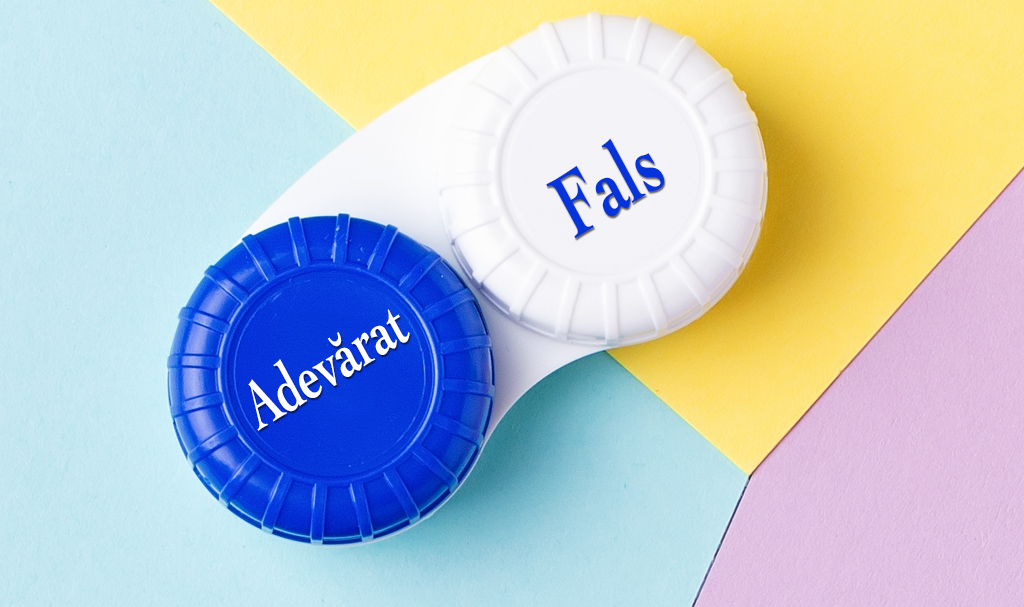The current contact lenses are a modern alternative to vision correction. They are comfortable to wear, easy to handle and transform the lives of millions of carriers.
What are the most common ‘myths and mysteries’ with regard to contact lenses?
Myth nr 1: The contact lenses are not comfortable. It has been many years since contact lenses were launched. But in the last few years, contact lens materials have grown tremendously. These new lenses are extremely soft, thin and flexible and very important to keep their moisture, which offers fantastic comfort. The material and design allow lenses to mold to the unique shape of your eye. Also, as you replace them regularly, you will feel the clean and comfortable contact lenses.
Myth nr 2: I do not like the idea of putting something in my eye. This is a normal reaction for a beginner in the field of contact lenses. It is understandable the initial hesitation, but this feeling will disappear as soon as the specialist shows you how to properly apply the contact lenses.
Myth nr 3: Wearing contact lenses usually leads to eye infections. Contact lenses do not cause infections. Microbes on the surface of a dirty lens initiate the infection. Only a lack of proper hygiene or incorrect contact lens wear can cause such problems. If you properly disinfect the lenses, clean them properly and replace them as recommended, the germs have no chance of survival.
Myth nr 4: The contact lens can slip and remains stuck behind the eye. It is not possible for a contact lens to fall behind the eye or under the eyelid if it moves. The eye has a protective barrier that covers the white of the eye and continues to float on the inside of the eyelids. This prevents the contact lens from penetrating behind it.
Myth nr 5: Lenses will fall from my eyes to fast movements. Due to the human eye anatomy, it is virtually impossible for the soft contact lens to fall out of the eye. That’s why you can practice all kinds of sports while wearing contact lenses. The force holding the contact lens on the eye surface depends on the diameter of the lens. If they are well adapted, they never fall.
Myth nr 6: Cleaning contact lenses lasts for eternity. Cleaning lenses is very important for eye health. Fortunately, the existing multifunctional solutions today are a simplified version that greatly facilitates the cleaning and maintenance of contact lenses. The best way to disinfect and clean the lenses is to leave them in solution at night.
Myth nr 7: I can not use makeup products if I wear contact lenses. You can make your makeup, but you have to follow some simple rules: apply it after inserting the contact lenses and remove the lenses before scrubbing.
Myth nr 8: Colored contact lenses are only for those who need vision correction. The colored contact lenses are available with and without diopters. Which means you can wear colored contact lenses even if you do not need optical correction. However, these must also be adapted and prescribed by a specialist and require the same care as any other contact lens.
Myth nr 9: The contact lenses will not give me a clearer view than the glasses. Contact lenses give you a better view, they provide you with a wider field of vision and viewing than glasses no matter what direction you are looking for as opposed to eyeglasses move with your eyes. In addition, the lenses do not abrade, fall or break during physical activity. For any sport, contact lenses provide a better view than glasses.
Myth nr 10: I can not wear contact lenses because I have astigmatism. In the past, contact lenses to correct astigmatism were not available in all types of materials. Innovations that have emerged in recent years have changed this. Astigmatism is no longer a barrier to wearing contact lenses.
Myth nr 11: Contact lanes cost a fortune. The actual cost of contact lenses is lower than expected. Due to technological advances there is a wide range of contact lenses on the market. Depending on the type of lens you are using and the frequency at which you replace it, the daily cost of the contact lens may be less than the amount you spend on your newspaper or daily coffee. Specialists will help you find the contact lenses that best match your visual correction, lifestyle and budget.




